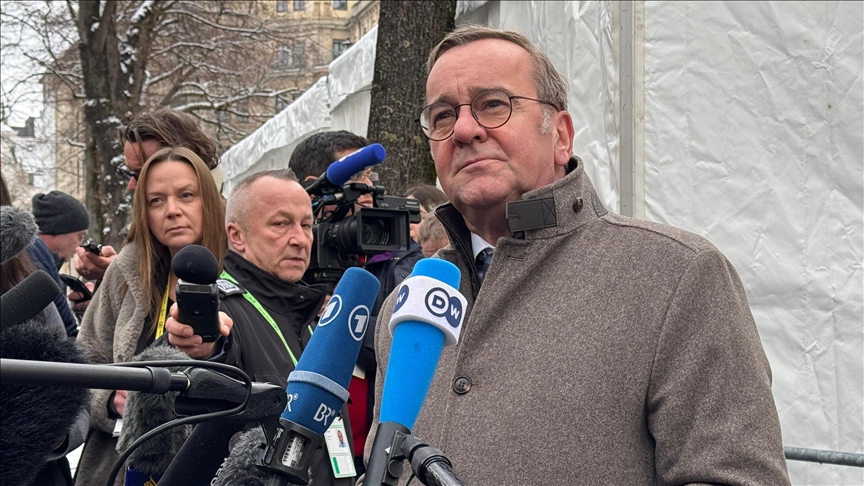German parties discuss boost in military aid to Ukraine: Defense minister
Boris Pistorius says Christian Democrats, Social Democrats discussing Taurus missiles for Ukraine, additional $3.25B defense aid in preliminary coalition talks
 German Defence Minister Boris Pistorius makes a statement outside the Hotel Bayerischer Hof, where the 61st Munich Security Conference (MSC 2025) is taking place in Munich, Germany on February 14, 2025.
German Defence Minister Boris Pistorius makes a statement outside the Hotel Bayerischer Hof, where the 61st Munich Security Conference (MSC 2025) is taking place in Munich, Germany on February 14, 2025.
BERLIN
German Christian Democrats and Social Democrats are discussing ways to boost military support for Ukraine as part of their preliminary coalition talks, Defense Minister Boris Pistorius said on Thursday.
Speaking at a news conference in Berlin, alongside his Ukrainian counterpart Rustem Umerov, Pistorius said Germany has already allocated €4 billion ($4.33 billion) in military aid for Ukraine in this year’s budget, with an additional €3 billion ($3.25 billion) aid package under consideration.
“The rapid financing of this package is now also the subject of the current exploratory coalition talks between the Christian Democrats and the Social Democratic Party, and I am of course committed to ensuring that we find a rapid solution here, so that we can provide the urgently needed military aid for Ukraine,” Pistorius said.
Asked about the delivery of long-term Taurus missiles — previously promised by Christian Democrats before the Feb. 23 elections — Pistorius said: “Yes, we have been talking about that during the last days, and we will continue doing that in the days to come.”
Germany's outgoing Chancellor Olaf Scholz strongly opposed sending long-range Taurus missiles to Ukraine, fearing that such action could directly involve Berlin in the conflict with Russia. His concerns regarding funding sources for an additional €4 billion military aid package caused approval delays.
Conservative leader Friedrich Merz, who is expected to be the country's next chancellor, has long advocated sending Taurus missiles to Ukraine, arguing this would strengthen Kyiv's position in potential peace negotiations.
In Germany's Feb. 23 elections, Merz's CDU/CSU alliance secured 28.5% of votes, while the Social Democrats recorded their lowest-ever result at 16.4%, yet their combined 328 seats would exceed the 316-seat majority needed in the Bundestag.
Preliminary coalition talks between the two parties are currently underway, with Merz aiming to form a government before Easter (April 20-21). The conservative leader has emphasized the urgency of establishing a new administration, citing both pressing domestic economic issues and growing international security challenges.
Anadolu Agency website contains only a portion of the news stories offered to subscribers in the AA News Broadcasting System (HAS), and in summarized form. Please contact us for subscription options.







